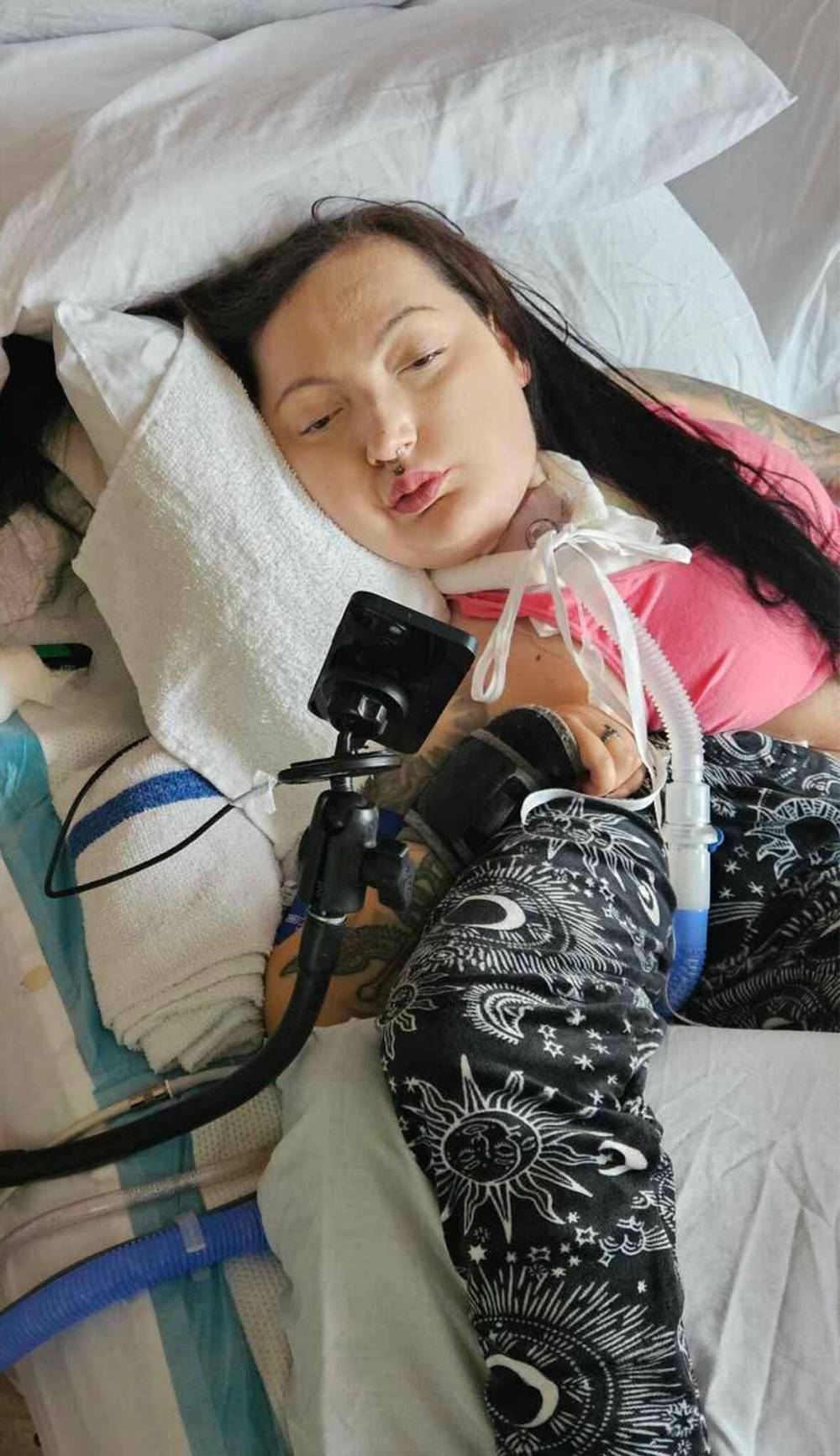‘I’m being forced into a place’
Woman with spinal muscular atrophy opposes plan to have her live in Riverview Health Centre
Advertisement
Read this article for free:
or
Already have an account? Log in here »
To continue reading, please subscribe:
Monthly Digital Subscription
$1 per week for 24 weeks*
- Enjoy unlimited reading on winnipegfreepress.com
- Read the E-Edition, our digital replica newspaper
- Access News Break, our award-winning app
- Play interactive puzzles
*Billed as $4.00 plus GST every four weeks. After 24 weeks, price increases to the regular rate of $19.95 plus GST every four weeks. Offer available to new and qualified returning subscribers only. Cancel any time.
Monthly Digital Subscription
$4.99/week*
- Enjoy unlimited reading on winnipegfreepress.com
- Read the E-Edition, our digital replica newspaper
- Access News Break, our award-winning app
- Play interactive puzzles
*Billed as $19.95 plus GST every four weeks. Cancel any time.
To continue reading, please subscribe:
Add Free Press access to your Brandon Sun subscription for only an additional
$1 for the first 4 weeks*
*Your next subscription payment will increase by $1.00 and you will be charged $16.99 plus GST for four weeks. After four weeks, your payment will increase to $23.99 plus GST every four weeks.
Read unlimited articles for free today:
or
Already have an account? Log in here »
Hey there, time traveller!
This article was published 13/01/2025 (376 days ago), so information in it may no longer be current.
Crystal Rondeau’s muscle wasting disease has left her with only one finger to press an alarm button or send a text.
The 35-year-old, who has spinal muscular atrophy Type 2, objects to the proposed plan to have her live in Riverview Health Centre in south Winnipeg after being treated at Health Sciences Centre for an infection.
“I’m not happy with this plan at all,” she said during a phone interview from her hospital bed. “I’m being forced into a place. It’s not right for them to decide where I live.

“I don’t believe in institutionalizing people with disabilities… they basically are telling me I am disposable.”
Her family has threatened to file a human rights complaint.
Cheryl Rondeau said her daughter was told she will have to go to Riverview because the health authority has not agreed to bump up the level of care she needs in her home. She wants care to increase to 100 hours a week from the 55 hours she has received for years.
She said the most the system would agree to is 68 hours. It means her mother would have to be the caregiver for the remainder of the time each week.
“Crystal is now 35 and she is at the end of her life,” said Cheryl. “Do I see her living in five years? No I don’t.
“But Crystal says I have to outlive her because she can’t be around without me. She says she would have to ask for (medical assistance in dying).
“There is no backup support.”
The family says health officials say Crystal’s main caregiver should be her 61-year-old mother, who lives outside Winnipeg.
“Crystal says I have to outlive her because she can’t be around without me. She says she would have to ask for (medical assistance in dying). There is no backup support.”– Crystal’s mother Cheryl Rondeau
During the 24 weeks Crystal has spent in hospital, battling an infection, if she soils her bed, or needs to be bathed, the hospital says it’s up to her mother to do it because protocol prevents staff from lifting her. Crystal has dropped to 73 pounds from 87 pounds when she was admitted.
Hospital protocols say that for every 50 pounds of a patient’s weight, one staff member can be involved in moving a patient, meaning two workers must move Crystal.
Because of the way her illness has affected her body, if two people lift her, she suffers pain and can be injured.
But Cheryl said, under the self-managed system at home, where the province provides funding for the individual to hire their own workers, there are no protocols and they can hire one person to lift her.
That protocol, in part, also caused Crystal’s scheduled surgery on Friday, to replace an infected port line, to be cancelled.
“HSC staff couldn’t figure out how to move her without Cheryl,” said Rae Metcalfe, Crystal’s doula.
“Nor did the whole team understand how badly Crystal is disabled and they didn’t have a (respiratory technician) available to handle Crystal’s trach (with ventilator) during the surgery… therefore, Crystal was sent back to her room and (they are) currently treating the infected port directly.
“It was a prime example of how the supposedly world class hospital couldn’t handle the needs of someone so disabled.”
Health Minister Uzoma Asagwara said they sympathize with the family.
“My heart goes out to the patient and their family,” said Asagwara. “I know navigating the health-care system can be challenging.
“Shared Health has assured me that they are looking into options for this patient and will continue working with the family to ensure that they get the care that they need and have an appropriate plan in place.”
“Crystal really should have a choice where she wants to reside. To me, it seems like a no-brainer for her to go back home.”– Stacey Lintern, CEO of Muscular Dystrophy Canada
A Shared Health spokesperson said “providing patients with quality care is our top priority and we are working with this patient to get them the care they need… We take patient input, feedback, and concerns about proposed care plans with the highest level of seriousness.”
As for the transfer to Riverview, the spokesperson said when a patient no longer needs hospital treatment a transition plan is created with the patient and family.
“Care teams first determine the safe, viable options available to the patient,” said the spokesperson in a statement. “This could include transfer to a facility able to meet their specific and ongoing care needs. Once options are determined the patient/family would be involved in conversations about next steps.”
Stacey Lintern, CEO of Muscular Dystrophy Canada, said in Manitoba and other provinces, it comes down to money.
“It really is heartbreaking,” said Lintern, who has sent letters to health officials to advocate for Crystal.
“Crystal really should have a choice where she wants to reside. To me, it seems like a no-brainer for her to go back home, but with 100 hours of care instead of capping it (lower)… Cheryl is an aging caregiver and, if she gets injured, there is no one to replace her.
“I was really hoping the system would find ways to send her home.”
kevin.rollason@freepress.mb.ca

Kevin Rollason is a general assignment reporter at the Free Press. He graduated from Western University with a Masters of Journalism in 1985 and worked at the Winnipeg Sun until 1988, when he joined the Free Press. He has served as the Free Press’s city hall and law courts reporter and has won several awards, including a National Newspaper Award. Read more about Kevin.
Every piece of reporting Kevin produces is reviewed by an editing team before it is posted online or published in print — part of the Free Press‘s tradition, since 1872, of producing reliable independent journalism. Read more about Free Press’s history and mandate, and learn how our newsroom operates.
Our newsroom depends on a growing audience of readers to power our journalism. If you are not a paid reader, please consider becoming a subscriber.
Our newsroom depends on its audience of readers to power our journalism. Thank you for your support.
History
Updated on Monday, January 13, 2025 6:20 AM CST: Corrects reference to Crystal Rondeau




